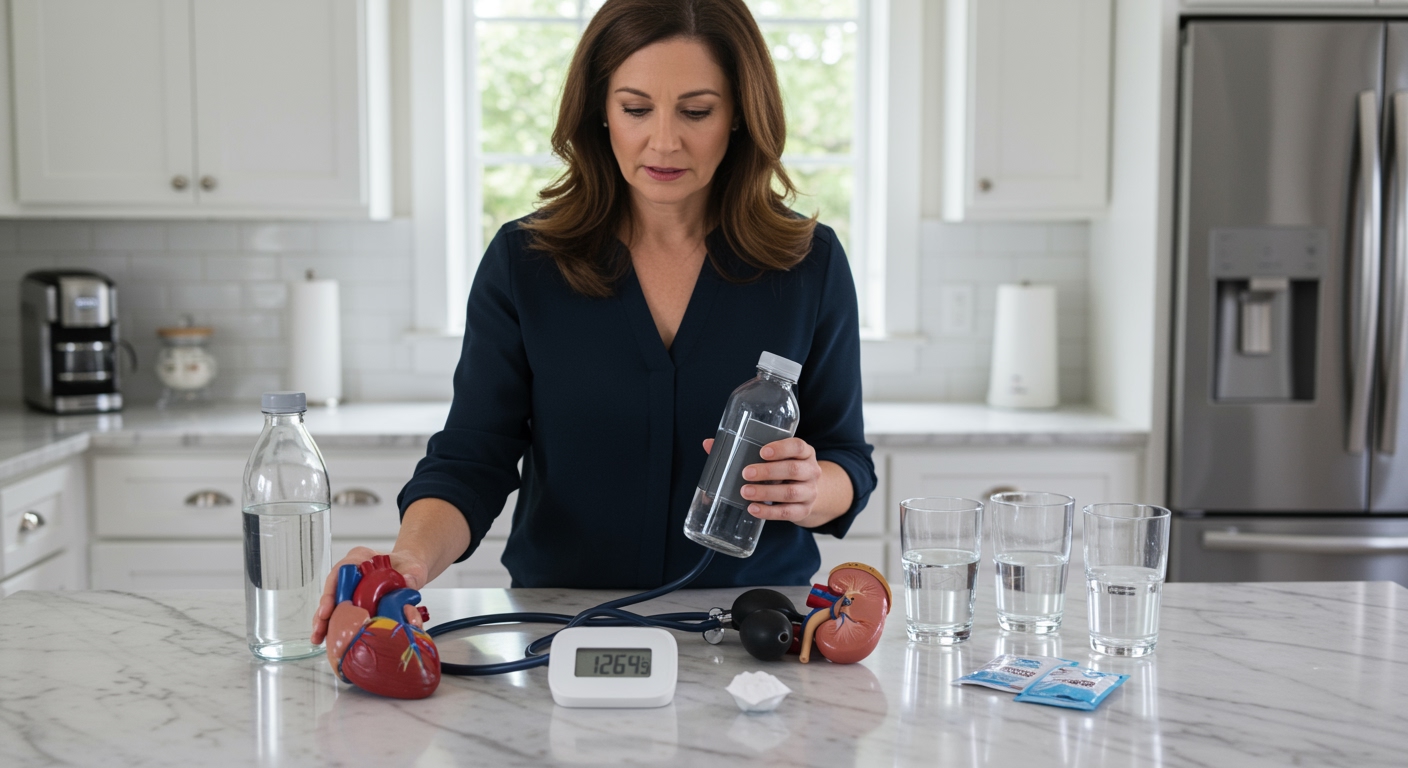✪ Key Takeaway: Dehydration can cause dangerous blood pressure drops by reducing blood volume and triggering compensatory mechanisms that may fail.
Introduction
You feel dizzy when you stand up after sitting for hours in the summer heat.
Your heart races and you feel weak, but you assume it is just the weather affecting you.
Hi, I am Abdur, your nutrition coach and today I am going to explain how dehydration can cause dangerous blood pressure drops that put your health at serious risk.
How Does Dehydration Actually Affect Your Blood Pressure?
Your blood is about 55 percent plasma, which is mostly water.
When you lose water through sweating, breathing, or urination without replacing it, your blood volume decreases.
Think of your circulatory system like a garden hose.
When there is less water flowing through the hose, the pressure against the walls drops significantly.
Your body tries to compensate by making your heart beat faster and constricting blood vessels.
However, severe dehydration can overwhelm these protective mechanisms, leading to dangerous blood pressure drops.
✪ Fact: Losing just 2 percent of your body weight in fluids can trigger noticeable blood pressure changes.
What Are The Warning Signs Of Dehydration-Related Blood Pressure Drops?
The earliest sign is orthostatic hypotension, which means your blood pressure drops when you change positions.
You might feel dizzy or lightheaded when standing up from sitting or lying down.
Your heart starts beating faster as it tries to pump the reduced blood volume more efficiently.
You may notice increased thirst, dry mouth, and darker yellow urine as your body signals its need for fluids.
Fatigue and weakness become more pronounced because your organs are not receiving adequate oxygen and nutrients.
In severe cases, you might experience confusion, rapid breathing, or even fainting as your brain struggles with reduced blood flow.
✪ Pro Tip: Check your urine color throughout the day – pale yellow indicates good hydration while dark yellow signals dehydration.
Who Is Most At Risk For Dangerous Blood Pressure Drops?
Older adults face the highest risk because their bodies contain less water and their kidneys become less efficient at conserving fluids.
People taking blood pressure medications called diuretics lose more water through urination, making them vulnerable to rapid dehydration.
Athletes and outdoor workers who sweat heavily can lose dangerous amounts of fluids and electrolytes quickly.
Individuals with diabetes have higher urine output, which increases their risk of fluid loss and blood pressure drops.
People with heart conditions may struggle more when their cardiovascular system faces the additional stress of reduced blood volume.
Anyone experiencing vomiting, diarrhea, or fever loses fluids rapidly and needs immediate fluid replacement to prevent dangerous blood pressure changes.
✪ Note: Adults over 65 should monitor their fluid intake more carefully as their thirst sensation naturally decreases with age.
How Can You Prevent Dehydration-Related Blood Pressure Problems?
Start your day with a large glass of water to replace fluids lost during overnight breathing and metabolism.
Drink water consistently throughout the day rather than waiting until you feel thirsty, because thirst is a late sign of fluid need.
Increase your fluid intake during hot weather, exercise, or illness when your body loses more water than usual.
Choose water-rich foods like watermelon, cucumbers, and soups to boost your total fluid intake naturally.
Limit alcohol and caffeine because these substances can increase urine production and contribute to fluid loss.
Monitor your blood pressure regularly if you take medications or have risk factors, and contact your doctor if you notice unusual fluctuations or symptoms.
✪ Pro Tip: Keep a water bottle visible on your desk or counter as a constant reminder to drink fluids regularly.
When Should You Seek Medical Help?
Call emergency services immediately if you experience severe dizziness, fainting, or confusion along with signs of dehydration.
Seek medical attention if your blood pressure drops significantly below your normal readings, especially if accompanied by rapid heart rate.
Contact your doctor if you cannot keep fluids down due to vomiting or if diarrhea persists for more than 24 hours.
Get professional help if you take blood pressure medications and notice unusual symptoms when changing positions or during hot weather.
Visit urgent care if you have diabetes and experience excessive thirst, frequent urination, and blood pressure changes simultaneously.
Remember that prevention is always better than treatment, so maintain good hydration habits before problems develop.
✪ Note: Trust your instincts – if something feels seriously wrong with your blood pressure or hydration status, seek medical help immediately.
The Bottom Line
Dehydration can indeed cause dangerous blood pressure drops that threaten your health and safety.
Your body is like a finely tuned machine that needs consistent fuel and maintenance to run properly, and water is the most essential fuel of all.
Share your experiences with dehydration or blood pressure concerns in the comments below, and let me know if you have questions about staying properly hydrated for optimal health.
References
At NutritionCrown, we use quality and credible sources to ensure our content is accurate and trustworthy. Below are the sources referenced in creating this article:
- Healthline: Dehydration and Blood Pressure
- Amory Urgent Care: Dehydration and Blood Pressure
- Kelsey-Seybold Clinic: Connection Between Blood Pressure and Dehydration
- DripDrop: Dehydration and Blood Pressure





